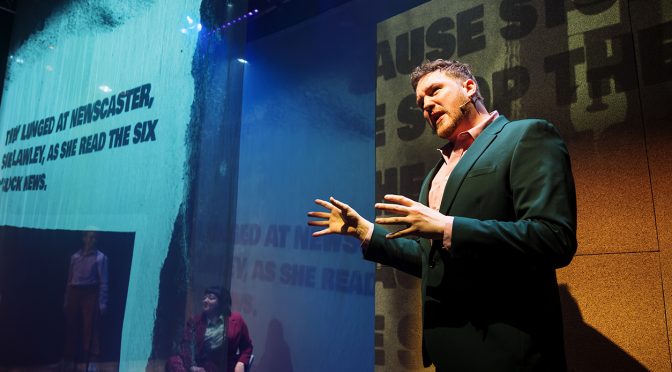We know a musical can be about anything… but the legislation introduced in 1988 to prohibit the promotion of homosexuality in schools? And while verbatim musicals are nothing new, using speeches from parliament and interviews in songs is tough. Thankfully, Breach Theatre, which brings this slightly mad idea to life superbly, knows that crazy can work. After the Act is energetic and emotive. The big surprise comes from making the topic so upbeat and empowering.
There is a lot covered. Key moments in LGBT history are recounted: remember those angry lesbians on the six o’clock news, or angry lesbians abseiling in the House of Lords? Hurrah for angry lesbians! And writers Ellice Stevens and Billy Barrett know it’s smart to present an argument, so supporters of Section 28 are given plenty of time. Their own words condemn them (there’s a lot of offensive language on stage) but, with the exception of Margaret Thatcher’s conference speech, the tone is cool. Offended parents even get the smartest song.
For me, it’s the personal testimony from activists or people who were at school at the time that are best. And extremely powerful. Stevens and Barrett, the latter also directing, structure the material well, with a rhythm of outrage and then the effects of the legislation. Political rhetoric and nasty newspaper headlines contrast with lived experience. And there’s an intelligent approach to the different ages in the audience – the show educates younger members while hitting home for anyone who remembers the time.

Excellent performances aid this ambitious project. Praise again for Barrett’s clarity in staging, important as the four cast members have to struggle with a lot of tongue’twisting lines and occasionally fussy choreography from Sung Im Her. The performers revel in the variety of roles. The highlights for Tika Mu’tamir and EM Williams come when they play protestors, bringing great sincerity to surprisingly understated performances. Stevens and Zachary Willis take on some of the most contrasting roles. The latter moves from outraged father to bullied schoolboy brilliantly, with forceful commitment and strong humour, too. The quartet is hugely enjoyable.
The show’s score is by Frew. Nobody is going to go away humming the numbers here as the ‘lyrics’ make the songs sometimes tricky to follow. And it is all a little too obviously hard to sing. Combining the songs with speech might be smoother. The score earns respect, though: the music is intelligent, works theatrically and sets the period very well. After all, this is a show about a piece of history… isn’t it?
You’d think the company would have enough to do, setting out and singing about historic homophobia, with the background of the AIDS crisis. The research is fantastic, and the quality and breadth of interviews for the show mean it serves as an important document. But its title is more than alliteration. After the Act looks at the legacy of Section 28, bringing us up to date to address the question of trans rights in schools. The show becomes campaigning in its own right. It’s an appropriate concluding note that important lessons are worth learning.
Until 1 April 2023
Photos by Alex Brenner

